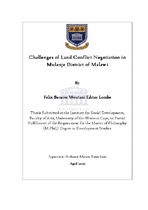| dc.contributor.advisor | Keim, Marion | |
| dc.contributor.author | Lombe, Felix Benson Mwatani Editor | |
| dc.contributor.other | Institute for Social Development | |
| dc.contributor.other | Faculty of Arts | |
| dc.date.accessioned | 2013-08-14T13:18:04Z | |
| dc.date.available | 2011/07/18 07:23 | |
| dc.date.available | 2011/07/18 | |
| dc.date.available | 2013-08-14T13:18:04Z | |
| dc.date.issued | 2009 | |
| dc.identifier.uri | http://hdl.handle.net/11394/1929 | |
| dc.description | Magister Philosophiae - MPhil | en_US |
| dc.description.abstract | This study identifies and discusses the challenges of negotiation as a conflict management tool with reference to the negotiation process of the land conflict in the Mulanje district of Malawi between tea companies and the villagers who live around the tea estates. Although the negotiation process started on 15th January 2000, there were no expected outcomes as of end of October 2008. In order to identify the challenges of the negotiation process, the study has specifically provided in-depth analyses of the land conflict and the negotiation process in Mulanje. The study consequently has recommended, among other things, the introduction of conflict transformation initiatives as a way of mending the relationship between the conflicting parties, institutionalization of conflict management training, review of the role of government and strategic cooperation of stakeholders in addressing the structural causes of conflicts among other recommendations. | en_US |
| dc.language.iso | en | en_US |
| dc.publisher | University of the Western Cape | en_US |
| dc.subject | Land reform beneficiaries | en_US |
| dc.subject | Malawi | en_US |
| dc.subject | Land reform | en_US |
| dc.title | Challenges of land conflict negotiation in Mulanje District of Malawi | en_US |
| dc.type | Thesis | en_US |
| dc.rights.holder | University of the Western Cape | en_US |
| dc.description.country | South Africa | |

